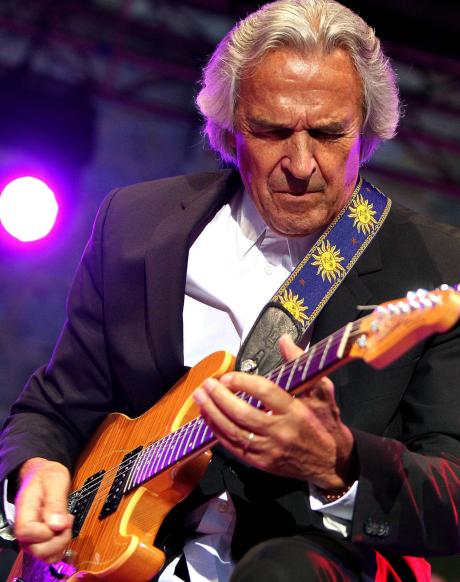As a jazz guitarist, John McLaughlin was guided by Far Eastern spirituality. He is now 80 years old and in excellent health.
Was everything really better in the past? “Not everything, but a lot,” says John McLaughlin, laughing. “The record shops were still social places where you could spend hours, meet friends and exchange ideas.” In the past, there was no YouTube, no TikTok, no permanent, uncoordinated sensory overload in which nobody could orientate himself. Listening to music has always been an active activity for him, which requires the whole person, says McLaughlin. Instead, it is now mainly about consumption. You can consume a burger, a coke, a sitcom; take as much with you as possible. Have fun! The main sufferers are the artists. “Record companies no longer offer contracts that allow musicians to work continuously. Even if they record a lot of clicks, they earn almost nothing. As a result, many talented young people can no longer make a living from their music.”
Don’t look back in anger. Rather the thoughtful reflection of a man who has dedicated his life to music, can actually make a living from it and today, January 4th, will be 80 years old. “Everyone turns 60 at some point, right?”, the miracle guitarist, born in Doncaster, England, flirts with the ominous date and vividly demonstrates the difference between biological and calendar age. He feels fit as a fiddle, is healthy and was extremely lucky. He meditates regularly and practices yoga in his adopted home of Monaco, where he lives with his German wife Ina.

In the early 1970s, John McLaughlin placed himself in the care of a guru
We would have expected nothing less from someone like John McLaughlin. The gentleman, who always appears distinguished and friendly, with his haircut, which was almost military-style in the early years, and the flowing white robes, is considered the prototype of the musician who was guided by Far Eastern spirituality. Like every meaning-seeking artist of the time, McLaughlin, who hails from a small town in Yorkshire, England, entered the care of a guru in the early 1970s.
His name was Sri Chinmoy (1931-2007) and made the young man renounce worldly pleasures, who previously learned to play the guitar largely autodidactically on blues, swing, modern jazz and flamenco records and on the British scene, where he participated in the side of Graham Bond, Mick Jagger, Alexis Korner, Brian Auger, Eric Clapton, Jack Bruce and Ginger Baker. No more sex, drugs and no more rock ‘n’ roll.
McLaughlin made Indian music enduringly popular in the West
He called his most successful band the Mahavishnu Orchestra. In 1973 he recorded “Love Devotion Surrender” alongside Carlos Santana, a milestone in the fusion of rock and jazz. With the band project “Shakti”, McLaughlin ensured that Indian music became popular in the West in a more lasting and professional way than, for example, George Harrison did under the influence of sitar pope Ravi Shankar. The guitarist achieved another level of popularity in a trio with fellow stringers Paco de Lucia and Al Di Meola. A testosterone-fuelled, high-speed trio that filled halls and whose live album Friday Night In San Francisco sold two million copies.
A bridge builder: that was what John McLaughlin had always been. Actually, Miles Davis, on whose milestone works “Bitches Brew” and “In A Silent Way” the smart Brit participated, was the architect of this bridge, which was called jazz rock or fusion. But McLaughlin completed it, embellished it with lovely details and took care of the big picture – sustainability. The alliance of Indian and Western cultures also inspired him. “There was a vital osmosis between the divisions, which unfortunately no longer works today. The scene is fragmented.” He and his companions had managed to inspire a broad public for sophisticated, innovative sounds. Music, John McLaughlin is convinced, turns the innermost part of the human being outwards without taking the path through consciousness. “I experience it in such a way that I only have to let them in by opening up and becoming empty. Music is mystic. You forget yourself completely, you are no longer in your body and you only exist in the common sound.”







More Stories
This was a gig to match its excellence: Olie Brice at the Vortex: Video, Photos
In tune with Jefferson Berry: A unique blend of acoustic urban storytelling: Videos, Photos
If he were a guitarist he’d be as well-known as Eric Clapton, but Terry Hanck is a sax player! Videos, Photo